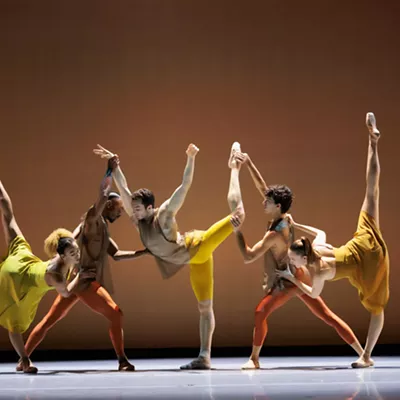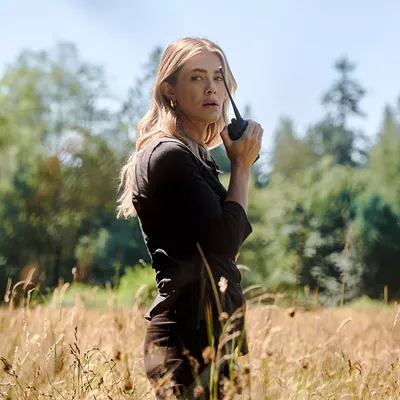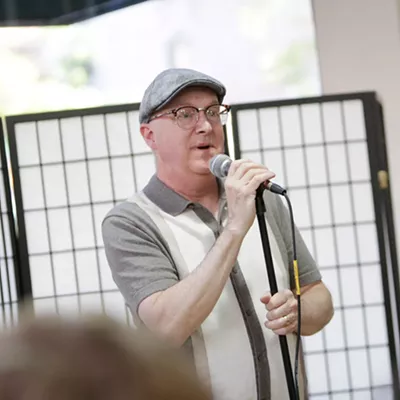At the funeral, my new boss Trev told me that his Grandpa Dan "fought in the holocaust."
I stared at him.
"I think you mean World War II," I said.
He stared back at me.
"The one with Hitler?"
"Oh, yeah," he said, "that one."
Six years I had bartended for Dan at this bottom-shelf bar in the Spokane Valley, called, not surprisingly, Dan's.
I took the job after my husband passed, to have someplace to go every day. Then, after six good years, Dan died and his family put his 23-year-old idiot grandson in charge, even though Trev's only previous management experience was a Nintendo controller.
I can't say Dan didn't warn me about his grandson. "I've taken shits smarter than that kid," he used to say.
I thought he was exaggerating until Trev's first day at work. Very first order he takes, he slides up to me. "Hey Susan, what's in a gin and tonic?"
"Rye," I said. "Compari. Muddled Bisquick."
Doesn't take a genius to pull a Budweiser, but Dan was right: his grandson was a topknot dipshit.
A woman bartender learns to see through the stool-squats in a place like Dan's. Takes a week for them to realize you won't sleep with them. After that you get the truth: who's cheating on his wife, who's cheating on his taxes, who's cheating L&I.
So it wasn't a big surprise when the regulars started cheating Trev out of tabs. First rule of business: put a dumbf—- behind the bar and you will get f—-ed dumb.
The family must've realized Trev was overmatched, because after a month they sent his older sister to take over. Angie. Business degree from Gonzaga. Only thing worse than stupid — stupid with some college.
Angie called a staff meeting. Had a laptop and powerpoint. She seemed disappointed that her staff consisted of her brain-stem brother, and me, a postmenopausal widow whose last shit was given sometime back in the '90s.
Angie started by telling us about how much better the bars were downtown. She showed slides of storefronts, back-bars, smiling young people. "Speakeasies, gastro-pubs, locally sourced, small plate places," she said, "it's what I want to do here — craft beer, small-batch bourbons, artisanal, local — that going to be our motif now."
Trev's hand rose like a second-grader about to piss in reading group.
"A motif is a theme, Trev," Angie said.
That's what I mean about college — this walking bangle thinking everything has to have a theme, like hippies who believe rocks have souls.
There was only one theme in a bar like Dan's: Get Drunk Here.
But it turned out we weren't even Dan's anymore. Angie did a slow reveal of our new name and logo, a 1 and an 8: "From now on, we are ... Eighteen!"
"Because of our address," Trev said.
Angie and I looked at him. Our address was 9324 East Sprague.
"No, for the eighteenth amendment," she said.
"Right to bear arms," Trev said.
"Prohibition," Angie said.
"A bar for ex-cons," Trev said.
"That's probation," Angie said. "The eighteenth amendment prohibited the sale of alcohol."
"You want us to stop selling alcohol?"
God, I loved my job.
Angie explained that our motif was pre-prohibition, that the 18 should also suggest the year 1918, one year before prohibition. "Tin drinking cups, absinthe, gaslight fixtures," she said, "that kind of thing."
Hipster nonsense.
She showed us a catalog of suspenders and old-timey hats. No way I was wearing that. "I love it," I said.As I told the stool-squats, "What can it hurt, classing the place up, hiring a real cook? No more microwaving Hot Pockets to fool the liquor control board into thinking we have food."
Angie hired an iron artisan to hang a blacksmith-style 18 from a wrought iron frame above the door. First day the sign was up a carload of teenage girls came in thinking we were a clothing store. I wondered who might come next: Congressmen?
Worried about the confusion, Angie had three swinging panels made to hang under the 18. One word on each sign: Food. Drink. Nostalgia.
As I told the stool-squats, putting Drink and Nostalgia on a bar sign was like putting "Lonesome" and "Boner" outside a strip club.
At first, nothing much changed. Every once in a while, someone ordered a Sazerac, but mostly I just kept pulling drafts. Pouring from plastic. But I guess one thing did change.
Trev ate this 1918 shit up. He whacked his topknot, grew a waxy mustache, started calling everybody Dame and Cholly. He even read a book — his first, I think — on pre-prohibition bartending.
He'd set the book down and bore us with 1918 facts. "Susan, did you know they didn't put olives in martinis until the forties?"
We hadn't made a martini in Dan's since the forties, but I encouraged him, because — well — who doesn't want to see a train wreck?
And that's what happened. One day a young reporter from the alternative newspaper came in to investigate this trendy suburban bar.
By this point Trev looked like a Keystone Kop: brush mustache, bowler hat, suspenders. He started mixing her a Mary Pickford. "You know," he said over his shoulder. "If it really was 1918, you couldn't be even here unless you were a sporting girl. You know, a whore — "
"Floozy," said one of the stool-squats. "Hooker," said another. "Slut," said a third.
"Women couldn't even vote," Trev said, as if he was the only one in the world with this information. "In a lot of ways, it was a simpler time." He slid the drink in front of her. "That's kinda the motif we're going for."
I have to say, the reporter's story was fair. Trev looked more ignorant than malicious. I only wish Dan could've seen the headline: Bar tries misogyny motif. He would've laughed his ass off.
That's what I miss most: his laugh.
Five years I slept that with the old coot. And I do mean slept. Dan couldn't have gotten wood at a lumberyard. But that's okay. After my husband died, all I wanted was to wake up next to someone.
We kept it quiet because Dan didn't want his family to know. "It's unseemly, a woman in her 50s and a man in his 80s," he said. "Besides you'd never get another tip."
He always said he wanted me to have the bar after he kicked, but he never got around to writing that into his will.
Oh well.
What was I going to do with a misogyny bar?
After the newspaper story, Angie quit. Trev and I thought it best to drop the whole pre-prohibition motif. When people asked about the sign, 18, we went with Trev's answer and said it was for the address.
We still have those other three signs, too, Food, Drink and Nostalgia, below the 18. Every day, I park beneath that word. Nostalgia.
I have buried two men now.
I miss them both. And I've lived long enough to know the whole trick to living is letting go of things.
Still, you wouldn't be human if you didn't sometimes long for what used to be. ♦
Jess Walter is the author of six novels, including Citizen Vince, The Zero and the New York Times-bestselling Beautiful Ruins. An excerpt of his next novel, a story called "Plante's Ferry," will appear in Harper's in July, while the novel is set for release in late 2019. Born and raised in Spokane, Walter lives in the West Central neighborhood, but has downed his share of pints in Spokane Valley's dive bars.




















